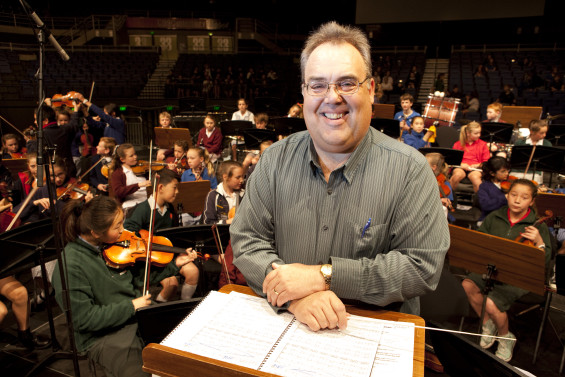Dr Patrick from Christchurch explains why music education is vital for young people to thrive
 University of Canterbury Senior Lecturer in Music Education, Dr Patrick Shepherd, of the College of Education Health and Human Development, discusses why music education is vital for our young people to thrive.
University of Canterbury Senior Lecturer in Music Education, Dr Patrick Shepherd, of the College of Education Health and Human Development, discusses why music education is vital for our young people to thrive.
“I am a firm believer that if you want new ideas, read old books, and they don’t come much older than those written by Plato, who said of music, “I would teach children music, physics, and philosophy; but most importantly music, for in the patterns of music and all the arts are the keys of learning.”
I have taught music in various different schools and colleges for nearly 30 years and I remain a staunch advocate for music as the perfect subject where all the others meet. I’m sure many of my colleagues would make similar claims for their subjects, too, but the wealth of research, from Plato onwards, points to music as the key to a meaningful and rich education for a child.
Grand claims, but how does this actually work? Through music a child is exposed to counting (maths), reading (literacy), comprehension (deciphering musical notation in a “foreign” language), creativity (composing), cultural competency (kapa haka and waiata), physical education (playing instruments), science (experimenting with sound and how it is made) and historical contexts (social studies) to name but a few but not forgetting perhaps the most important aspect which is the co-operation and social interaction that being involved in music brings. Music has taken me all over the world, to every continent – including Antarctica – meeting the most amazing people and doing things I could not otherwise have done, so I know all about how music nurtures and provides.
So why this sudden need to speak out? A recent study has sparked debate about the state of music in our primary schools and the picture it paints is, frankly, bleak. Studies come and go, as will this one, but the underlying trend remains if one traces the various monitoring reports that have followed music education since the mid-1980s. It also makes the valid point that many schools do it very well and put a high priority on it, while others place their emphasis elsewhere with music hardly getting a look-in. The study also highlights the part the Colleges of Education play.
At the University of Canterbury’s College of Education, Health and Human Development we recently restructured our Bachelor degree and Graduate diploma and, as part of that process, I consulted my colleagues from other providers to see how much time they were allocated to deliver a music programme. While I will always argue for more time for music and the arts no matter how much time I’m given (because enough is never enough), it became clear that we were offering more than the other providers and certainly more than the 3 hours cited in the report (although during a radio interview they modified that to 6-8 hours, still on the low side).
In the design of our arts programmes at UC those that come in with no music get exposure to basic elements such as beat, notation and rhythm and practical instruction on guitar, recorder or ukulele, while those who already have a background in music have the opportunity to develop their passion further as they think about how they can make music an integral part of their classroom teaching. We also like to sing and many lectures, not just the music ones, start with a waiata. Our students see that music matters, that it can tie together all the other parts of the curriculum and that musical knowledge supports all the other knowledge and understanding.
Do they want more? Absolutely, because I certainly do. I also want to see a shift in society’s attitude to music education across the developed world that puts it at the top of the pile rather than near the bottom. Our students see and believe that so if this recent study does one thing, I hope it keeps the debate alive long enough for them to make that change.
University of Canterbury Senior Lecturer in Music Education, Dr Patrick Shepherd is passionate about music education, technology and creativity. His musical compositions have been performed throughout New Zealand, in the USA, South Korea, Germany, China, Russia and Australia.
loading...
loading...



Voices of our community